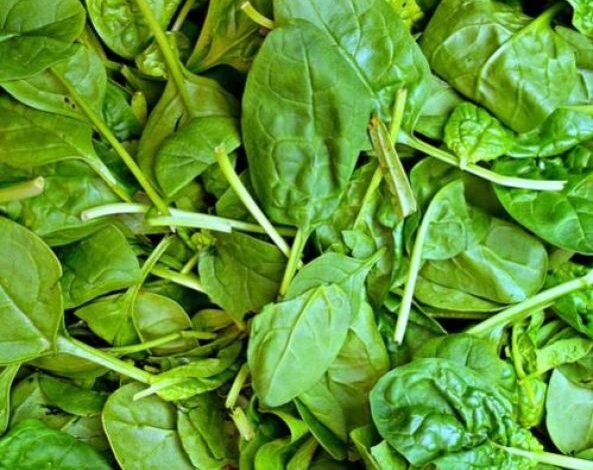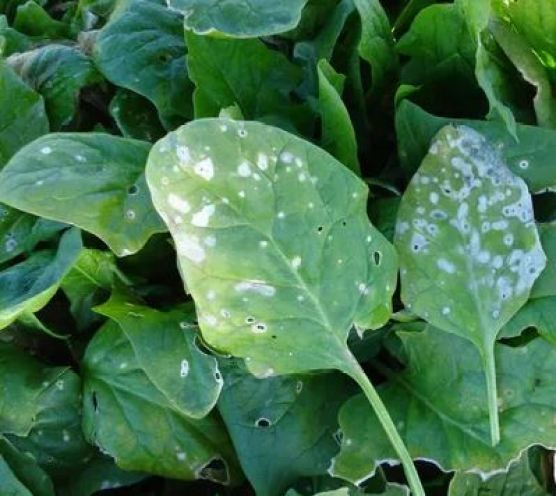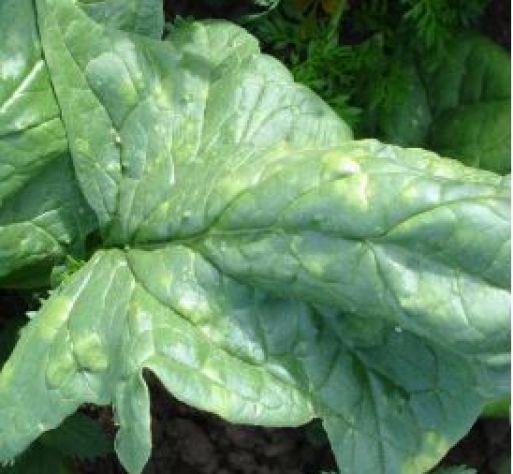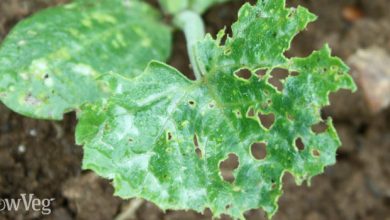Spinach Diseases: Leaf Spots, Viruses, and More

Hello to all gardeners! In previous articles we already saw which were the most important pests of spinach. To complete this information, in today’s article we will see which are the spinach diseases that are most common in the garden.
Of all of them, we can anticipate that diseases caused by fungi are the most common. These diseases include: Alternaria, Botrytis, Cladosporium, Cercosporiosis, Mildew , etc. These types of spinach diseases are very similar to those of the beet crop.

White spots on spinach leaves
If we observe white spots on the spinach leaves, it may be due to various diseases. Among them are: the powdery mildew or cladosporiosis.
We have already spoken about powdery mildew on other occasions. One of the most characteristic symptoms of powdery mildew is the presence of white powder on the leaves of the plants. With the passage of time, this white powder will spread over the leaf surface. The powdery mildew is a disease quite common in other cultures. For example: in cucurbits, such as squash (Cucurbita maxima duchesne) , zucchini (Cucurbita pepo) , melon (Cucumis melo) or cucumber (Cucumis sativus). In addition, it can affect other vegetables, such as beans (Phaseolus vulgaris), chard (Beta vulgaris) or potato (Solanum tuberosum).
Cladosporiosis is a fungal disease caused by Cladosporium variabile. It is identified by causing small round white spots on the leaves. This disease is spread through seeds, wind, or rain. If it rains and it is cool, it will be an opportune moment for this fungus to enter our garden.
I leave you here a photo of this disease to help you recognize it in the future.

Dark spots on spinach leaves
If, on the other hand, what we see in our spinach plants are darker spots, it may be due to other types of diseases such as Cercosporiosis or Anthracnose.
- If the spots are round and surrounded by a reddish halo, it may be a disease known as Cercosporiosis.
- If the spots have a necrotic appearance and evolve until they occupy a large part of the surface of the leaf, it may be Anthracnose. Anthracnose is due to a fungus known as Colletotrichum dematium . It is a fairly common disease in this crop.
Yellow spots: mildew on spinach
Mildew is one of the most characteristic and frequent diseases of spinach. It is characterized by causing chlorotic spots on the upper side of the leaves and a greyish mold appears on the underside. This deterioration of the leaves occurs very quickly.
This disease is due to a fungus known as Peronospora farinosa and can appear in both spring and autumn. It usually appears when the environment is humid and dim. It can be transmitted through the wind and seeds. Also, the spores of this fungus can survive in the soil for many years.
All stages of the spinach crop are susceptible to an attack by Downy Mildew. Especially the young leaves are the most affected.

There are also other types of light brown spots that may be due to Alternaria.
Spinach virus
In addition to diseases caused by fungi, our spinach can also be affected by viruses. One of the most important viruses in this culture is the cucumber mosaic virus (CMV). This virus can be transmitted through aphid bites (in a non-persistent way) or through infected seeds.
Some of the most characteristic symptoms of the cucumber mosaic virus are the growth arrest of the plant and the deterioration of the spinach leaves. A kind of mosaic appears on the leaves that causes them to turn yellow.
In addition to this there may be another virus known as the virus of the mosaic of beet ( Beet mosaic virus , BMV). This virus can also be transmitted by aphids when they bite on leaves.
Growing organic spinach: organic remedies against fungi
Once we know how to identify the main diseases of spinach , it is necessary to learn to control them with ecological remedies . To do this, we will see different prevention and control methods that you can use in your orchards and gardens.
Prevention of spinach diseases
As always, I remind you that prevention methods are those that will help us prevent the appearance of spinach diseases . Among all the preventive methods that exist, the most important ones are listed below:
- Crop rotation
- Using varieties resistant to diseases will help us reduce the risk of them appearing on our plants.
- Control the irrigation system to avoid possible floods or irregular watering.
- Monitor the presence of aphids to avoid the subsequent transmission of viruses.
- Eliminate weeds as they can also have many of the diseases.
- Disinfect materials used with diseased cultures.
Organic remedies against spinach fungi
Once we have seen how to prevent spinach diseases, we will see how to control them with organic remedies .
- As for disease control, I encourage you to consult the article on how to make homemade fungicides . In the article you will see how to perform each of the methods step by step.
- Against mildew we can use sodium bicarbonate, Bordeaux mixture or potash soap .
- Remove the most damaged leaves to prevent the disease from spreading to other plants in the garden.



![Photo of Lavender Pests and Diseases: [Detection, Causes and Solutions]](https://www.complete-gardening.com/wp-content/uploads/2022/08/lavender-pests-and-diseases-detection-causes-and-solutions-390x220.jpg)
![Photo of Equatorial Climate: [Characteristics, Flora, Fauna and Adaptability]](https://www.complete-gardening.com/wp-content/uploads/2022/08/equatorial-climate-characteristics-flora-fauna-and-adaptability-390x220.jpg)